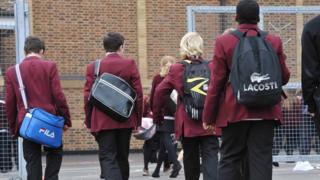Anxiety levels among young teenagers dropped during the coronavirus pandemic, a study has suggested.
Thirteen to 14-year-olds were less anxious during lockdown than they had been last October, according to the University of Bristol survey.
Researchers surveyed 1,000 secondary school children in south west England.
They said the results were a “big surprise” and it raised questions about the impact of the school environment on teenagers’ mental health.
The findings come after Prof Chris Whitty, the UK’s chief medical adviser, said children were more likely to be harmed by not returning to school than they were if they caught coronavirus.
The UK’s four chief medical officers have sought to allay parents’ concerns ahead of schools reopening in England, Wales and Northern Ireland in the coming days. Schools in Scotland have already returned.
In a joint statement, the nations’ four chief medical officers said evidence suggested schools were “probably not a common route of transmission”.
And in a bid to encourage parents to send children back to school, Boris Johnson has said it is “vitally important” pupils return to the classroom, with the life chances of a generation at stake.
Researchers compared findings from a survey taken in October last year to answers given by teenagers in May this year. Both girls and boys recorded decreased levels of anxiety during that timeframe.
In October, 54% of 13 to 14-year-old girls and 26% of boys of the same age said they felt anxious.
When surveyed in May – several weeks after schools shut to most pupils and nationwide lockdown restrictions came into force – the proportion dropped to 45% of girls and 18% of boys.
Researchers questioned 1,000 year nine students from 17 secondary schools across the south west of England.
‘Big surprise’
“With the whole world in the grip of a devastating pandemic, which has thrown everyone’s lives into turmoil, the natural expectation would be to see an increase in anxiety,” said lead author Emily Widnall.
“While we saw anxiety levels rise for a few of our participants, it was a big surprise to discover quite the opposite was the case for many of them.”
Miss Widnall said pupils who felt least connected to school before lockdown saw a larger decrease in anxiety, raising questions about how the school environment affects some younger teenagers’ mental well-being.
Dr Judi Kidger, from the University of Bristol, said: “Our findings raise questions about the role of the school environment in explaining rises in mental health difficulties among teenagers in recent years.
“As schools reopen, we need to consider ways in which schools can be more supportive of mental health for all students.”
There was a 2% decrease in boys at risk of depression and a 3% increase in girls at risk of depression.
The findings have been published in a report for the National Institute for Health Research School for Public Health Research.
Meanwhile, the UK’s largest teaching union has accused the government of letting down pupils, teachers and parents by failing to have a “plan B” if infections rise.
The National Education Union, which represents more than 450,000 members, said more staff, extra teaching space and greater clarity on what to do if there is a spike in cases is needed for schools to reopen safely.
It is expected that pupils in Northern Ireland going into years seven, 12 and 14 will return to school full-time on Monday, with the rest going back from 31 August. In England and Wales, pupils will return to school from 1 September.
- SUMMER PLANS CANCELLED?: Joe Wicks is here for you – bringing you sunshine in a podcast
- GCSE AND A LEVEL STRESS: How to deal with exam result emotions
